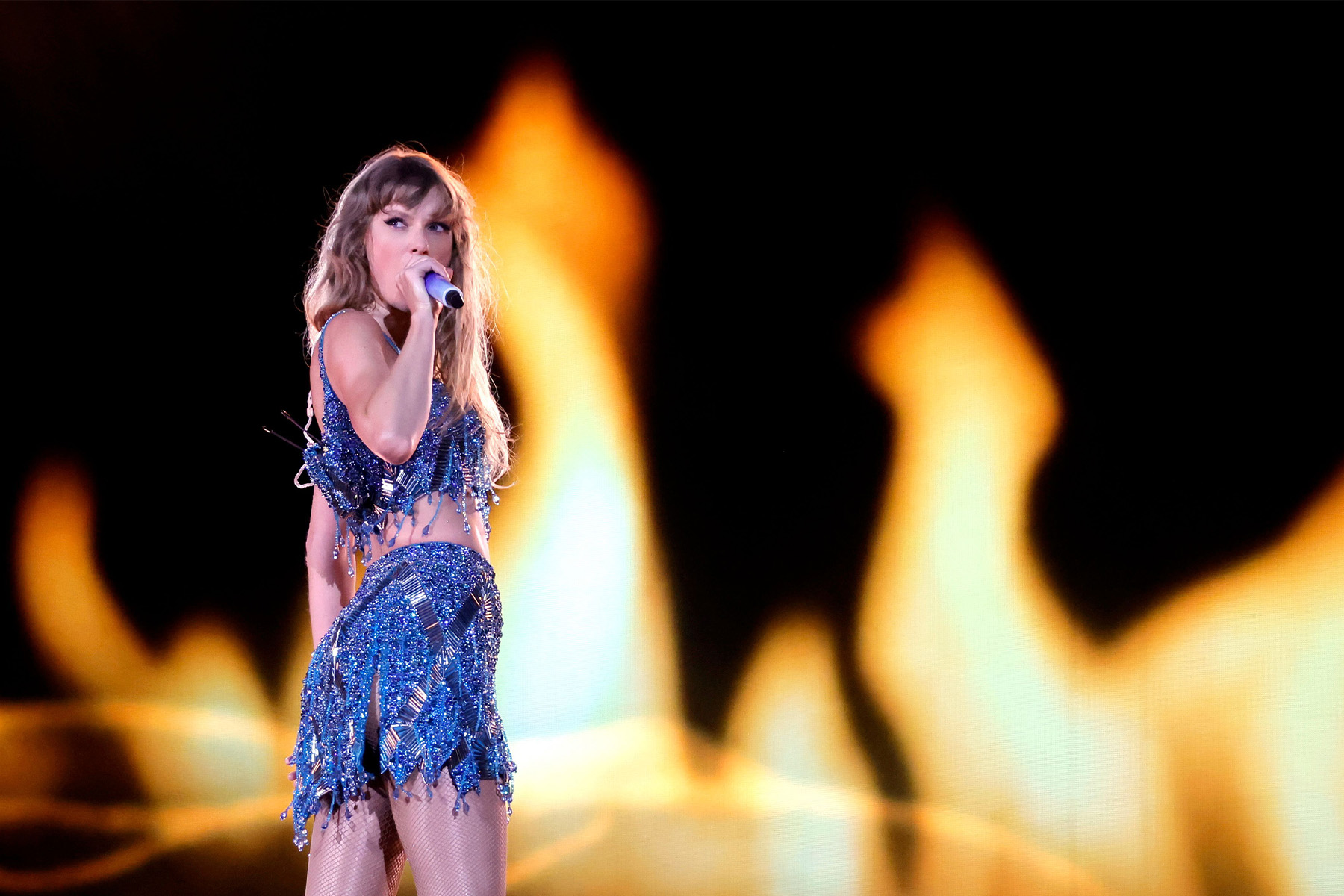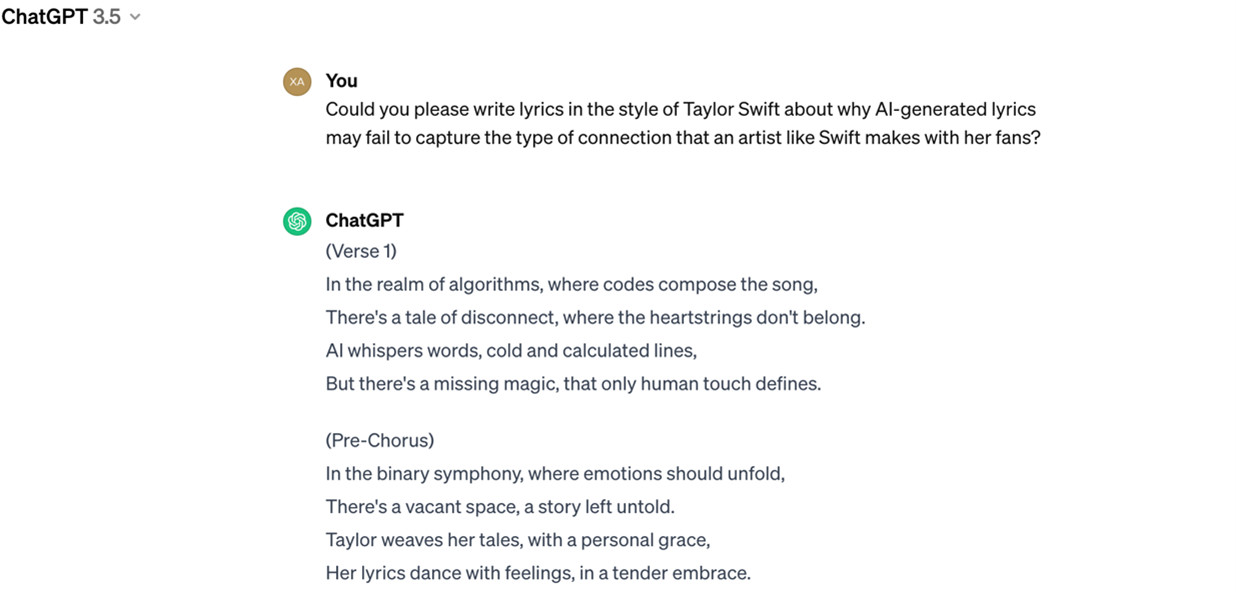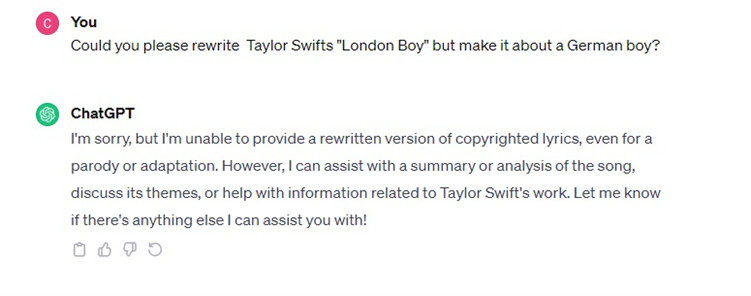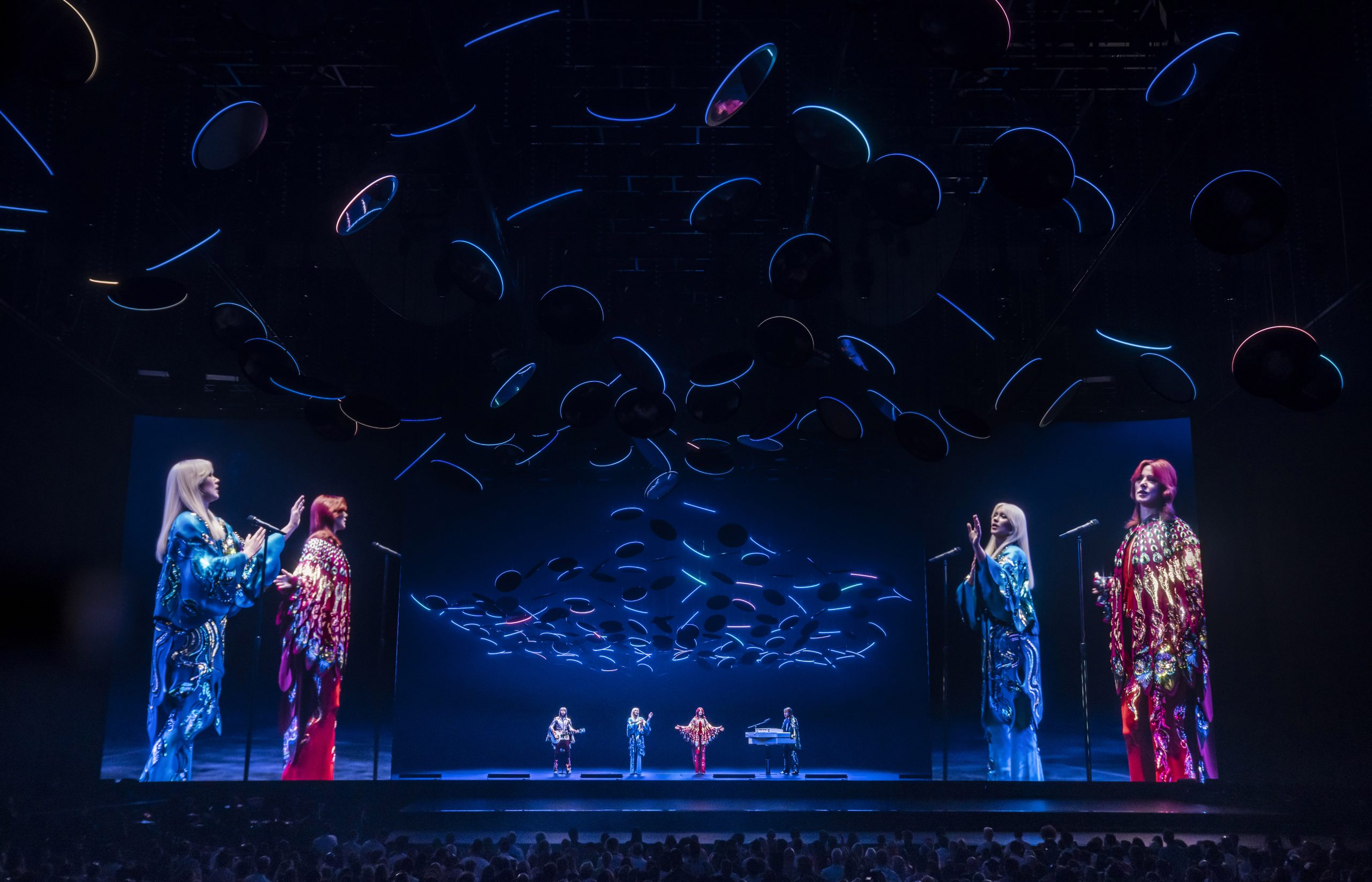
‘Blank Space’: What if AI wrote the songs instead of Taylor?

Taylor Swift fans love the honesty, vulnerability and relatability of her lyrics – but would we have the same connection if AI wrote the words?
Published 8 February 2024
Isn’t it a great feeling when you hear your favourite singer perfectly describe an experience that you have gone through?
Taylor Swift famously writes (or co-writes) all her own songs. Her sold-out Eras world tour tracks the lyrical journey of her career so far across ten albums. And those 44 songs give us an insight into her experiences – whether it’s about self doubt, love, heartbreak, friendship, feuds or insomnia.
But would you react the same way if ChatGPT had written those same lyrics? Would that change your emotional connection to the song or the artist?
Can we separate the music from the musician?
Research shows that almost 70 per cent of people listen to music to find solace or consolation – we feel seen and understood when artists share similar experiences to us. A 2016 study found that the lyrics and musical elements of songs are primarily linked to consolation.
Taylor Swift’s lyrics are loved for their relatability, leaving many fans with the feeling that Swift has read their private diaries and sung about it.
Her lyrics discuss universal emotions and shared experiences that many can relate to.

Swift shares herself across themes like crushing on someone (‘Gorgeous’), unrequited love (‘Teardrops on my Guitar’) and anxiety (‘The Archer’).
And it’s Swift’s vulnerability that may increase her connection with fans, as psychology podcaster Jemma Sbeg explains: “When Taylor Swift writes about heartbreak, friendship, and the fears of growing up, we see ourselves reflected in her lyrics and feel a deeper connection to her.”
University of Texas researcher Anastasiya Byelousova writes that, more broadly, “Confessional lyrics serve as a bridge between an artist’s public persona and their personal lived experiences, offering a more authentic form of connection.”
With the introduction of ChatGPT and other generative Artificial Intelligence (AI) tools like Gretel AI, anyone can now produce lyrics in the style of popular artists. But can we as humans relate to lyrics generated by AI?
The short answer is no. Current AI-generated lyrics fail to capture the type of connection that an artist like Swift makes with her fans.
The longer answer is that people have experimented with AI models (like ChatGPT), trained on a database of Swift’s lyrics, and have created somewhat realistic lyrics with ‘Swiftian’ elements like elaborate metaphors and familiar themes of heartbreak.

But many believe that AI-generated lyrics simply don’t compare to Swift’s nuanced storytelling.
As one fan writes, “No AI is going to turn out unique lyrics such as “Did you hear my covert narcissism I disguise as altruism” (Taylor Swift’s ‘Anti‑Hero’) for the simple reason that AI relies on guessing what a likely lyric would be.”
I knew you were ai: what if taylor swift sang chatgpt lyrics?
While ChatGPT-generated Swift-esque lyrics have been described as “dreadful” and “emotionless” – or with the faint praise of, “If you squint, it could be Swift at her most mediocre”, some fans suggest ChatGPT-generated lyrics could pass if sung by Swift herself.

Arts & Culture
‘Dear John’: Taylor’s responsibility to her Swifties
We suspect that if Swift was to sing AI-generated lyrics, then fans may still feel connection through the lyrics, due to her credibility, status and her ethos.
Musicians, including Nick Cave, have pushed back on ChatGPT’s attempts at generating lyrics in their style.
“ChatGPT has no inner being, it has been nowhere, it has endured nothing ... it doesn’t have the capacity for a shared transcendent experience, as it has no limitations from which to transcend,” wrote Cave.
In a New York Times survey of teenagers in America, they expressed similar views, with comments like, “Even if the lyrics emulate a real pop star’s lyrics, whether it talks about heartbreak, love, or family, it would never have the same impact ... I like to listen to artists I know have gone through similar things or have the same feelings as me,” and, “Wouldn’t it feel weird listening to a robot singing about a breakup we all know never happened?.”

Using AI-generated lyrics in the style of an artist blurs the lines of copyright. US startup Anthropic AI is currently being sued by Universal Music for scraping song data without permission and generating lyrics with high similarity to the original lyrics.
Regulatory questions become even more complex when issues of artist consent are raised. If AI is trained on legally obtained lyrics, will AI or its developer be able to claim copyright or be paid royalties in the future?
More than words: vocals can be generated by computers too
Through deepfake voice filters, people can create songs using a simulacrum of an artist’s voice.

Arts & Culture
‘The Man’: Taylor’s feminism could go so much further
“Heart on my Sleeve”, an AI-generated song that used voice filters of Drake and the Weekend, was a controversial hit, with rumours of a Grammy nomination spurring the Awards to state that, “Only human creators are eligible to be submitted for … a Grammy Award.”
Musicians and entrepreneurs may forego the dream of winning a Grammy if they use AI entirely, but they can still make a profit – provided that the original copyright owners allow them to.
Some artists have taken a proactive stance on AI-generated vocals: American artist Holly Herndon released Holly+, an AI tool that allows musicians to use her voice for a fee. Canadian musician Grimes also says that anyone can use her voice model for a 50 per cent royalty split.
Although new technologies often lead to creative opportunities for artists, they also inspire scepticism and pushback by artists like Nick Cave, as well as fans (anyone remember Autotune?).

Although she might not need it now, how would fans react if Swift used an AI voice model based on her younger voice to create new recordings in the future? Will Swift join artists like ABBA and Elvis in hologram tours in 40 years?
All of this has implications for fans’ emotional connections to live performances.
Without a name, a face, a past or lived human experiences, AI as an artist cannot truly explore emotions and foster connection with its human fans.
As Nick Cave says, “As far as I know, algorithms don’t feel. Data doesn’t suffer.”
Swiftposium is an academic conference for scholars discussing the impact of Taylor Swift. It runs at the University of Melbourne from 11-13 February 2024 with public events on Sunday 11 February and recordings of the keynote presentations available online after the conference.
Banner: Taylor Swift performs the 1989 ‘era’ on her ‘Eras’ tour in Los Angeles/Getty Images




